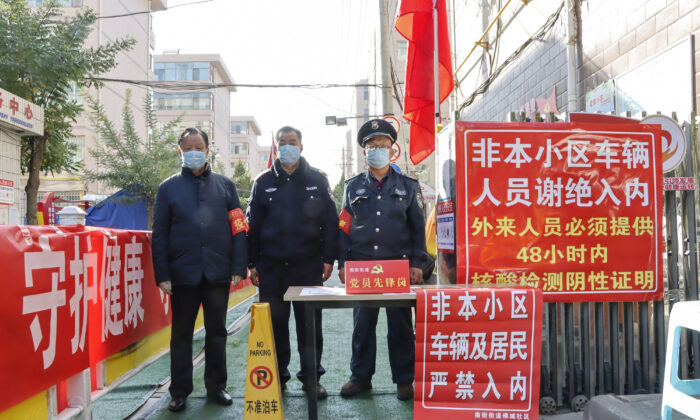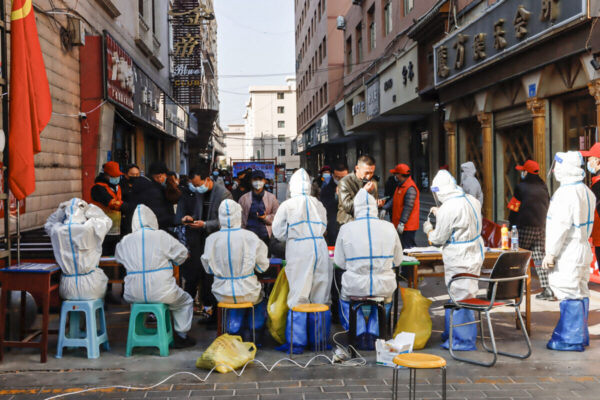
Security staff stand guard at the entrance of a residential area following Covid-19 cases in Zhangye in China’s northwestern Gansu Province, on Oct. 23, 2021. (STR/AFP via Getty Images)
By
A 3-year-old Chinese boy died on Nov. 1, allegedly due to lockdown policies that delayed getting medical treatment.
The boy’s father, Tuo Shilei, said, “I personally think that he was indirectly killed” [by China’s zero-COVID policies].
Tuo and his family live in Lanzhou, the seat of China’s northwestern Gansu Province.
The death of Wenxuan, the 3-year-old boy, triggered online outcry and Chinese social media users blasted the regime for its draconian lockdown measures that have caused deaths across the country.
Locals gathered on Nov. 1 to protest against the lockdown measures that delayed the medical treatment of the boy. A special police force arrived swiftly with shields to shut down the protest.
Death of the 3-Year-Old Boy
Tuo and his family live in Lanzhou, the capital city of China’s northwestern Gansu Province, which has been locked down for months amid recent outbreaks of the pandemic.
He found his wife passed out at around midday on Tuesday after being affected by gas fumes while cooking. He performed CPR for his wife, and he found his son had fainted as well. He then performed CPR for his son, which helped briefly. He made six calls to the Chinese emergency number 120 for an ambulance but was not answered.
From the first emergency call Tuo made at 12:15 p.m. till he finally took his boy to the Lanzhou Maternity And Child Health Hospital after 2 p.m., the local pandemic control staffers at different checkpoints stopped him from going out. They claimed that Tuo and his boy couldn’t exit as they didn’t have PCR tests.
Tuo crashed through the barriers with the help of neighbors, who also managed to get a taxi for him, which took him to the hospital only 1.8 miles away from his residence.
The boy died at about 3 p.m. from respiratory and cardiac arrest caused by suffocation, according to the death certificate issued by the hospital. A contradictory notice issued by the local police says that the boy died from carbon monoxide poisoning.
The Lanzhou government and department of health and the Gansu provincial government did not immediately respond to a request for comment from Reuters.

Medical staff members conduct nucleic acid tests for the COVID-19 coronavirus in Zhangye in China’s northwestern Gansu Province, on Oct. 23, 2021. (STR/AFP via Getty Images)
A Weibo user named Probably a Writer posted online a detailed timeline and description of the incident with phone records of Tuo, a death certificate issued by the hospital, and a police notice after allegedly interviewing Tuo. The post was archived by China Digital Times before it was removed from Chinese social media platforms.
China Digital Times is a U.S.-based bilingual media organization that “archive[s] content that has been or is in danger of being censored in China.”
Special Police Force Arrived in Busloads to Suppress Protest
The residents from Tuo’s residential compound stayed at the locked-down entrance after Tuo left for the hospital on Nov. 1, protesting against the lockdown that delayed medical treatment for the boy, causing his death, according to a neighbor of Tuo.
Ms. Chen (pseudonym), a neighbor of Tuo’s, said in a phone interview with the Chinese language edition of The Epoch Times on Nov. 2 that a special police force came in busloads after the protest broke out.
The Epoch Times has obtained an online video clip that shows the arrival of special police wearing black helmets and carrying shields. The Chinese characters on the shields read: “Lanzhou special police.”
The leading police officer waved his right hand at the crowd, ordering them to step back.
Residents didn’t appear to be scared by the special police.
Some residents used their mobile phones to shoot videos of the police, while some can be heard making various comments.
A woman said: “You special police have come more quickly than the ambulance!”
“The Chinese Communist Party is so scary!” a man can be heard saying mockingly.
“Ah! Special police are like this!” a man said.
Chen said that the special police force patrolled outside the compound on Nov. 1 and Nov. 2, pressuring the locals to stay within the compound. The special police called the gathering people “rebels” and said that they were “picking a fight,” according to Chen.
The protesting crowd didn’t disperse until past 7 p.m., and the special police beat up several locals and injured an elderly man with a metal clamp, Chen said.
The Epoch Times wasn’t able to verify the authenticity of the undated video.
The Chinese language edition of VOA reported that a family member of Tuo was beaten by the special police.
Public Outcry
The incident triggered a public outcry among Chinese netizens.
One hashtag, “Three years of COVID was his entire life,” became a trending topic before being removed.
“The three-year-old kid is gone, but the three-year-long pandemic [control] still stays,” Weibo user Coachman1699 wrote.
“From the [miscarriage of a] pregnant woman in Xi’an, to the bus crash in Guizhou, to this incident in Qilihe District [in Lanzhou.] Shouldn’t we think of the fact that the pandemic prevention and control have caused greater harm than the pandemic itself? ” wrote a user by the name of Sunfangtingangryeveryday.
The pregnant woman in Xi’an lost her baby on the evening of New Year’s Day because a hospital rejected her on the grounds that her nucleic acid test result had just expired four hours prior.
A Guizhou official government health bus transferring patients to quarantine facilities overturned on Sept. 18, killing 27 and injuring 20 more.
Numerous cases of people dying because they were unable to get medical care due to zero-COVID measures have drawn viral outrage this year, including during Shanghai’s two-month lockdown since April and in Xinjiang which has been stringently isolated since August.
Censorship
Local officials threatened Tuo and his family to keep silent, according to Chen.
“Officials from the municipal government of Lanzhou came to the entrance, and they dragged the family of Tuo to the roadside, telling them not to blame the authorities for the death of the boy,” Chen said.
“‘You just say that the boy died from carbon monoxide poisoning,’ I heard the government officials say this to Tuo’s family. They are actually threatening Tuo’s family,” Chen said angrily.
Tuo’s family didn’t agree, Chen said.
Chen added that Lanzhou is now under strict censorship and that the incident is not able to be seen or heard on the internet in China.
Tuo said he was later contacted by a person who claimed to be a retired local official and offered to arrange for Tuo to be sent 100,000 yuan ($13,743) if he signed a pledge agreeing not to go public or seek redress over the incident.
Tuo said he rejected the offer, instead demanding an explanation for his son’s death.
“No help was provided. This series of events caused the death of my child,” Tuo said.
There are two online posts that show the local government’s orders to restrict staff members to take interviews and block community networks.
One of the posts requires customer service staffers of an internet company to respond to inquiring customers as per preset statements, which claim that the internet is out of service due to upgrading.
The other post says that none of the staffers of the local neighborhood office is to receive TV or phone interviews without approval by the district propaganda department. The post asks to pass on the order to all the staffers working at various checkpoints.
These two posts are archived by China Digital Times. The Epoch Times wasn’t able to verify the authenticity of the posts.
The Chinese language edition of The Epoch Times has reached out to the local governments of Tuo’s district and neighborhood for comments and hasn’t received a reply as of press time.
Reuters, Xiao Lvsheng, and Gu Xiaohua contributed to this report.